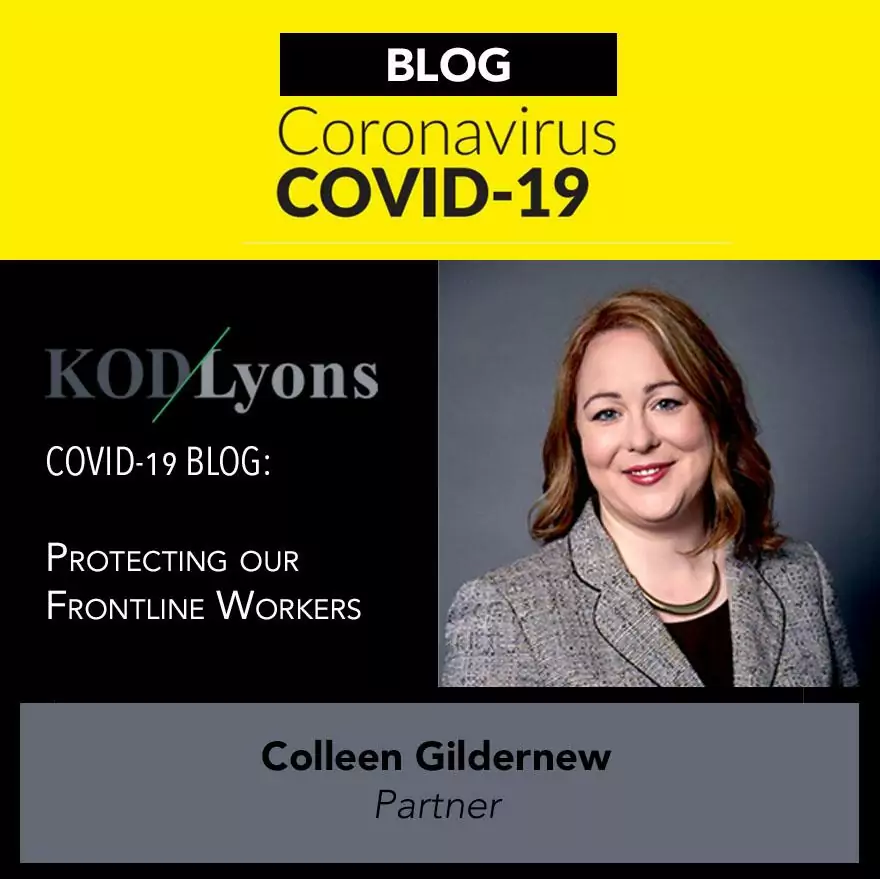In recent weeks, we have discovered a newfound appreciation for our frontline workers, in particular our healthcare workers. Although the government have yet to solve the difficulties around frontline worker childcare arrangements; the general public have rushed to show their gratitude in various ways, including through the provision of free meals and accommodation.
While we are all concerned about the possibility of contracting COVID-19, healthcare workers have, understandably, more to worry about than most. The majority of us are able to stay at home to protect ourselves. Frontline workers have no such luxury, and this has resulted in a much higher proportion of such workers contracting the virus. At some stages it has been reported that as many as 26% of all cases have been associated with healthcare workers. The Irish Nurses and Midwives Association reported in April 2020 that almost 1 in 10 of all the diagnosed COVID-19 cases were nurses[1]. As of 14th May 2020, a total of 7 healthcare workers had tragically died from the virus[2].
Under Article 2 of the European Convention on Human Rights, the State is under a legal duty to ensure that there are appropriate systems and regulatory frameworks in place to protect individuals from risk to their lives. It is arguable that because of several key problems in dealing with the corona-virus crisis, namely the early lack of Personal Protective Equipment [PPE]; delays in testing, and problems in nursing homes; the government may have breached this duty to protect our frontline workers.
Under the Infectious Diseases Regulations 2020, COVID-19 is classified as a ‘notifiable disease’ and therefore, any deaths due wholly or partly to COVID-19 must be reported to the Coroner. Deaths must also be reported when they have occurred in circumstances which may, in the public interest, require investigation by the Coroner[3].
In Britain, the Chief Coroner has recently issued guidance in relation to COVID-19 deaths. Under their laws, a COVID-19 death may be reported to the coroner if the virus may have been contracted in the workplace, and this includes health care and public transport workers. However, if a proper investigation requires evidence regarding policy and resourcing, such as the adequacy of PPE, then the coroner may suspend the investigation into it until it becomes clear how ‘such enquiries can be best pursued’.
Although we have no indication that similar investigative limitations might be adopted here, it is an issue which we need to be vigilant about. PPE shortages have been a real feature of the COVID-19 crisis in Ireland and across the world. Some of the PPE which was sourced in the early stages of the pandemic was completely unfit for purpose. It was also reported that in some hospitals, healthcare workers were being asked to re-use PPE which had been intended as suitable for single use only.
There have also been real difficulties in nursing homes. Although a higher mortality rate in nursing homes was to be expected, given that COVID-19 is particularly dangerous for older people and those with underlying conditions; the very high numbers of deaths in nursing home ‘clusters’ was by no means inevitable. Nursing Homes Ireland moved quickly, on 6th March 2020, to restrict visitors to nursing homes[4]. However, the HSE did not provide any official advice about limiting visitors to all but essential visitors until over a month later, 10th March 2020. There have also been major staff shortages in nursing homes, at least partly as result of early delays in testing.
We don’t at this stage, and we may never have, access to a breakdown of the data to see exactly how and where the frontline workers who contracted COVID-19 may have been exposed to the virus. However, it is almost inevitable that their work will have played a significant role in their diagnosis. In the relatively early days of the pandemic, on 9th April 2020, it was reported that 70 doctors and nurses in Cavan General Hospital had been infected with Covid-19.
It would be wrong for the death of frontline workers to be treated as a natural casualty of this pandemic. We need, as a society, to examine whether these deaths could have been prevented by proper protections being put in place, including the adequate supply of PPE and virus testing. The crisis is far from over, but these difficult questions will need to be addressed at some stage. There is a legal duty to properly investigate the deaths of our frontline workers; but there is also a moral duty to treat those who lost their lives with the dignity and respect that they deserve. The investigation into the deaths of frontline workers may well take the form of individual inquests; but there could also be a need for a statutory public inquiry to examine any systemic failures in the State’s handling of the crisis.
[1] INMO Press Release, 17th April 2020 – https://www.inmo.ie/Home/Index/217/13581
[2] https://www.rte.ie/news/2020/0514/1138284-nphet-covid-19-restrictions/
[3] http://www.coroners.ie/en/COR/Coroners%20Service%20Guidance%20Covid-19%20Version%206%20FINAL%20190420.pdf/Files/Coroners%20Service%20Guidance%20Covid-19%20Version%206%20FINAL%20190420.pdf
[4] https://nhi.ie/covid-19-coronavirus-nursing-home-care/
Get in touch
Leaders in our field and winners at the Irish Law awards we have proven expertise in immigration and international law, child and family law and personal injury litigation.
Tel: +353 1 679 0780
Email: info@kodlyons.ie








